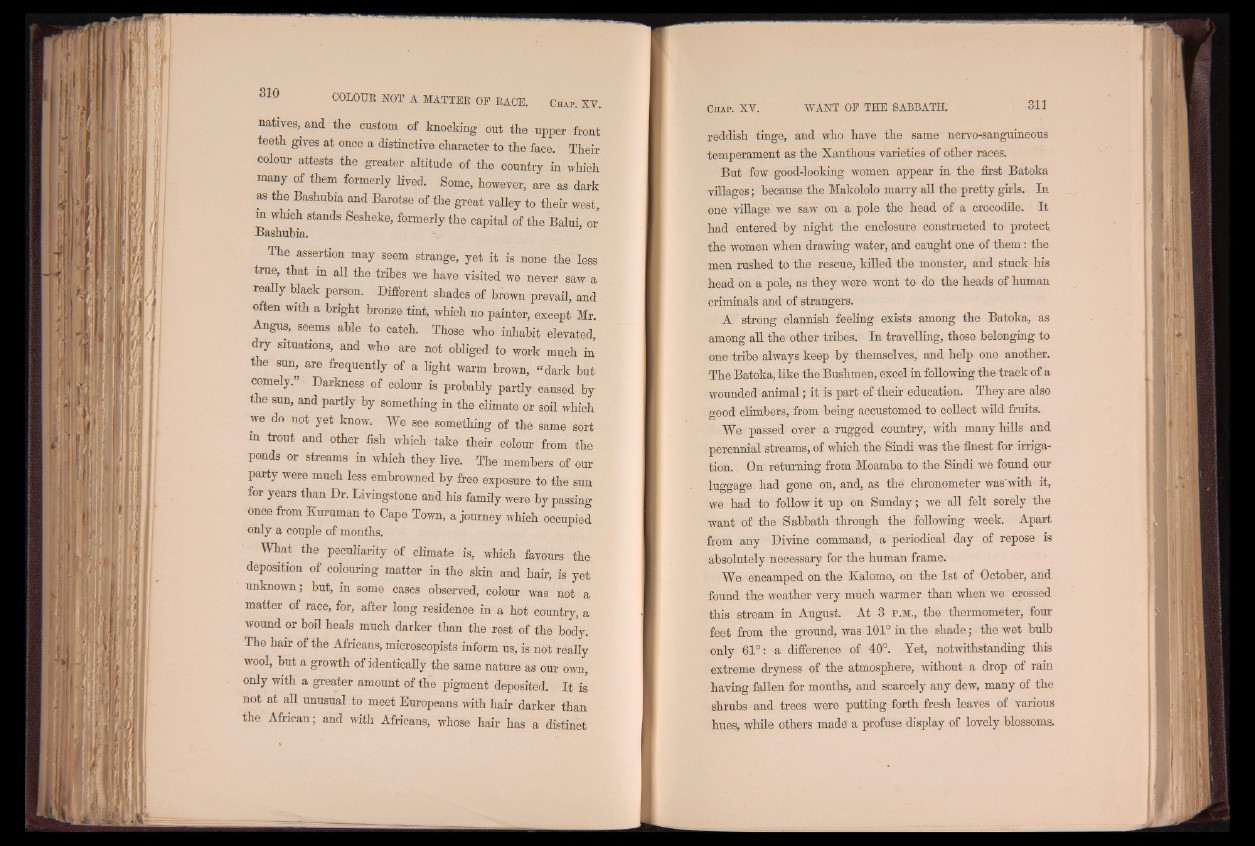
natives, and the custom of knocking out the upper front
teeth gives at once a distinctive character to the face. Their
colour attests the greater altitude of the country in which
many of them formerly lived. Some, however, are as dark
as the Bashubia and Barotse of the great vaUey to then- west,
m which stands Sesheke, formerly the capital of the Balui, or
Bashubia.
The assertion may seem strange, yet it is none the less
true, that in all the tribes we have visited we never saw a
really black person. Different shades of brown prevail, and
often with a bright bronze tint, which no painter, except Mr.
Angus, seems able to catch. Those who inhabit elevated,
dry situations, and who are not obliged to work much in
the sun, are frequently of a h'ght warm brown, “ dark but
comely.” Darkness of colour is probably partly caused by
the sun, and partly by something in the climate or soil which
we do not yet know. We see something of the same sort
in trout and other fish which take their colour from the
ponds or streams in which they live. The members of our
party were much less embrowned by free exposure to the sun
for years than Dr. Livingstone and his family were by passing
once from Kuruman to Cape Town, a journey which occupied
only a couple of months.
What the peculiarity of climate is, which favours the
deposition of colouring matter in the skin and hair, is yet
unknown; but, in some cases observed, colour was not a
matter of race, for, after long residence in a hot country, a
wound or boil heals much darker than the rest of the body.
The hair of the Africans, microscopists inform us, is not really
wool, but a growth of identically the same nature as our own,
only with a greater amount of the pigment deposited. I t is
not at all unusual to meet Europeans with hair darker than
the African; and with Africans, whose hair has a distinct
reddish tinge, and who have the same nervo-sanguineous
temperament as the Xanthous varieties of other races.
But few good-looking women appear in the first Batoka
villages ; because the Makololo marry all the pretty girls. In
one village we saw on a pole the head of a crocodile. It
had entered by night the enclosure constructed to protect
the women when drawing water, and caught one of them : the
men rushed to the rescue, killed the monster, and stuck his
head on a pole, as they were wont to do the heads of human
criminals and of strangers.
A strong clannish feeling exists among the Batoka, as
among all the other tribes. In travelling, those belonging to
one tribe always keep by themselves, and help one another.
The Batoka, like the Bushmen, excel in following the track of a
wounded animal ; it is part of their education. They are also
good climbers, from being accustomed to collect wild fruits.
We passed over a rugged country, with many hills and
perennial streams, of which the Sindi was the finest for irrigation.
On returning from Moamba to the Sindi we found our
luggage, had gone on, and, as the chronometer was'with it,
we had to follow it up on Sunday; we all felt sorely the
want of the Sabbath through the following week. Apart
from any Divine command, a periodical day of repose is
absolutely necessary for the human frame.
We encamped on the Kalomo, on the 1st of October, and
found the weather very much warmer than when we crossed
this stream in August. At 3 p .m ., the thermometer, four
feet from the ground, was 101° in the shade ; the wet bulb
only 61°: a difference of 40°. Yet, notwithstanding this
extreme dryness of the atmosphere, without a drop of rain
having fallen for months, and scarcely any dew, many of the
shrubs and trees were putting forth fresh leaves of various
hues, while others made a profuse display of lovely blossoms.